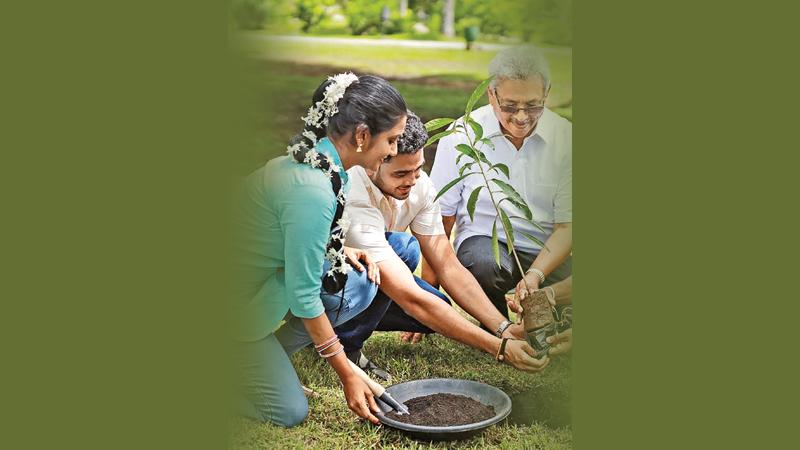
Forests and trees make important contributions to every living organism in the planet, strengthening livelihoods, providing clean air and water, preserving biodiversity and preventing climate change. Forests act as a source of food, medicine and fuel for the people. Therefore, it is important to protect the fast deteriorating forest cover in the country. Forests in Sri Lanka not only provide livelihood to many in the rural areas contributing to the country’s socio economic development but also help thwart the fast changing climate condition.
The alarming trend of deforestation has become a pressing issue for the Government. Records indicate that the size of the land covered by natural forests has decreased by a staggering 80% from 1948. As of now, the total forest cover in Sri Lanka remains at 27% of the total land mass. The reasons given for the degradation are increase in population, road construction, timber production, agricultural development and so forth.
Public opinion, however, defers. They are of the view that the poor management of Government authorities to control illicit felling of trees by various nefarious groups, often with the help of corrupt politicians is a reason for this. According to reports, from 2011 to 2018, the annual tree cover loss stands over 12,000 hectares. Recovering this loss is impossible unless the Government introduces stringent measures to control deforestation.
Sri Lanka experiences severe droughts and intense floods constantly. Eventually, water-related ecosystems provide clean water to the society. It is said that every tree in the forest is a fountain sucking water from the ground and releasing water vapour into the air. The impact of deforestation on rainfall is one of the most dangerous negative factors. Fertile and rich forests release a range of volatile organic compounds that has overall effects on our climate. Therefore, removing trees from forests will continue to have adverse effects on the country’s atmosphere. If deforestation continues, the small streams that contribute to the balance of our eco system, will fade away.
Generally, drought is thought as a natural disaster beyond human control. This is no longer a valid contemplation. Scientists around the world peered deeper into the changing climatic condition in the world and found that deforestation plays a crucial role in this alarmingly hazardous phenomenon. Felling trees in the forest releases stored carbon dioxide which entraps heat and increase atmospheric warming. The simple fact is that clouds require moisture released by trees to induce rainfall. The reduced water storage manifests longer dry spells which we as Sri Lankans experience throughout the country year after year.
President Gotabaya Rajapaksa, in his manifesto, has clearly stated his policy on protection and conservation of biodiversity, and declared that the Government will bring the control of these tasks under the purview of a single institution. To this writer’s knowledge, all authorities relevant to biodiversity were never under a single Ministry or institution since independence. Therefore, this decision has to be lauded. The manifesto states that the national forest cover will be increased by 30% from the current 27%, which is a daunting task, but an achievable goal if stern leadership is provided by the President. The President’s vision of establishing parks in urban and semi urban areas and developing urban vegetation would contribute to national tree cover growth and more importantly reduce the unbearable heat in urban and semi urban areas.
The biggest damage to the country’s forest and tree cover is through illegal logging, currently taking place in various scales, throughout the country. As per the Forest Department’s website, the forest in Sri Lanka is legally sheltered by the Forest Ordinance, National Heritage & Wilderness Areas Act and Fauna & Flora Ordinance. Despite the legal measures under these acts illicit loggers continue to fell trees. Illegal logging does not just involve stealing trees from forests, but goes beyond the actual ground situation to the bureaucratic and political arena. It involves illegal practices related to processing, licensing, transporting and trading.
Forest conservation in Sri Lanka takes place amid contradictory and poorly implemented regulations. Regulatory loopholes and unclear boundaries of governing laws between ministries and departments and other related agencies contribute to illegal logging and forest conversion.
It is regrettable that the writer’s many attempts to communicate with officials of the Forest Department to obtain information and their viewpoint on the matter were unsuccessful. The Department’s non user friendly website also was not very helpful and does not contain adequate data.
Illicit tree felling is an issue that enables corruption, social conflict, deprivation of state revenue and a threat to the country’s natural resources. Poor supervision by Government institutions along with the prevailing lethargic and indifferent attitude of the officials, has to be monitored. A proper mechanism to enable the prevailing laws over illegal logging needs immediate Government attention.
The society, at present, witnesses a newly induced public interest in tree planting, largely created by media, particular, by the television channels. Hence, the media must continue to engage further, in addition to the implementation of intensive Government plans promised in the manifesto.
Healthy forest and tree cover is essential for the sustainability of planet earth. Forests command great influence on the climate, soil, and environment of the country and the world at large. The nation as a whole must make every effort to protect the forests and to increase the forest cover.
